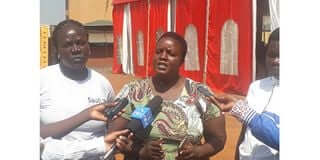
Our Projects are
Transforming African Trade
Quick Contacts
2nd Floor, Fidelity Insurance Centre Waiyaki Way, Westlands

The African Union (AU) Peace and Security Council has applauded African governments and its partners for launching initiatives empowering women cross-border traders.
During its 1144th open session, dedicated to discussions on integration of women, peace and security agenda in the implementation of African Continental Free Trade Area (AfCFTA), the council reaffirmed the critical role women traders play in the eradication of household poverty.
It, however, expressed concern that the gains made in unlocking the economic potential of informal cross-border women traders is under constant threat of being rolled back by conflicts in AU member states.
“[The Council] notes with deep concern that women continue to be disproportionately affected in conflict and post-conflict situations, including the adverse impact faced by women traders,“ it noted in its communique released after the session.
According to United Nations Conference on Trade and Development, informal cross-border trade represents up to 40 per cent of regional trade in Africa, with women being the largest shareholders. They constitute 70-80 per cent of the informal traders in the region.
The informal economy is a major employer in Africa absorbing 30 and 90 per cent of total non-agricultural employees.
In countries such as Benin, Tanzania and Nigeria, its productivity makes up to 65 per cent of Gross Domestic Product (total monetary value of all final goods and services produced, and sold on the market, within a country during a period of time, typically a year).
Last week, fighting erupted in Sudan as the country’s armed forces battled against the Rapid Support Forces (RSF), a paramilitary group, for control of the country and its capital.
The fighting has brought the country to a stand still; people cannot leave their homes.
There are no recent figures on the number of women-headed households, but, according to data from Food and Agriculture Organisation, by mid-1990s, more than 35 per cent of the households were headed by women.
In the country, women are more than twice as likely to be unemployed.
Data from the International Monetary Fund indicates that 50 per cent of the population living below the poverty line are in households with unemployed heads.
As of April 18, 2023, at least 185 people, had been killed in the fight, according to the United Nations special representative for Sudan. With dead, missing or displaced husbands, women are left sole providers of their families.
The pressure to meet their needs pushes them to join informal employment as tea and food sellers, domestic workers or petty traders, jobs that are non-existent now with the fighting.
Over the years, across Africa, governments and their private partners, including banks, have launched women-tailored financial products.
In Rwanda, for instance, the Bank of Kigali has rolled out Zamuka Mugore, which means uplifting women.
The facility, a lending and savings scheme, allows women in small-scale businesses to access loans of up to Rwf5 million (Sh656,037).
In Kenya, Kenya Commercial Bank runs a female-led and made enterprise programme through which women-led enterprises can borrow unsecured loans repayable within 48 months.
The Kenyan government has also digitised Women Enterprise Fund, enabling women to access affordable credit through mobile phones.
At the AU level, the council urged member states to “redouble their efforts in facilitating access to support facilities for women cross-border traders, including access to start-up capital and safety nets with a view to eventual transitioning into the formal economy to benefit from the AfCFTA.”
Read original article
Disclaimer: The views and opinions expressed in this article are those of the authors and do not necessarily reflect the official policy or position of TradeMark Africa.